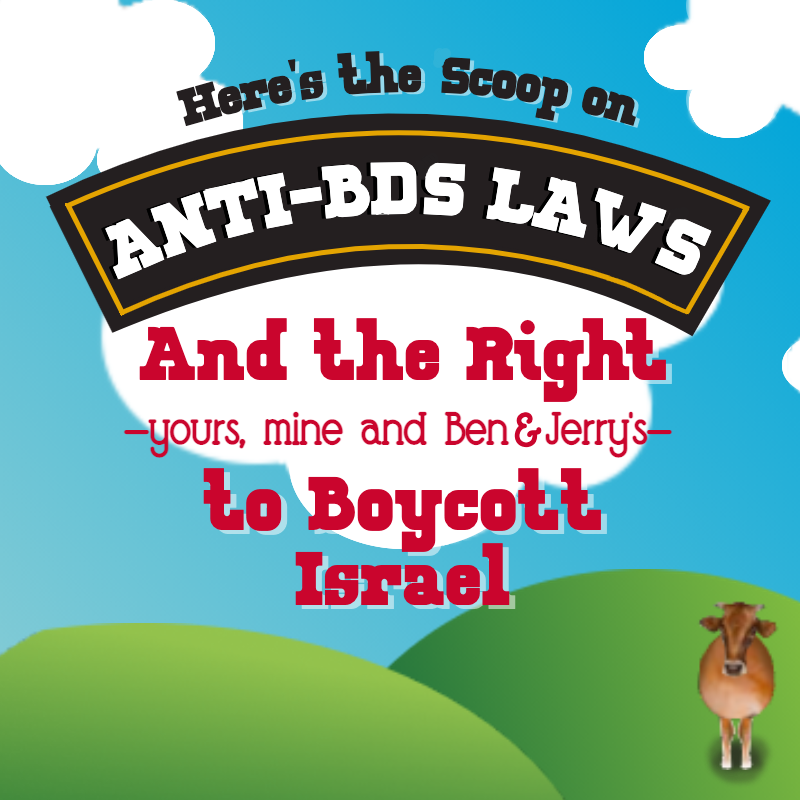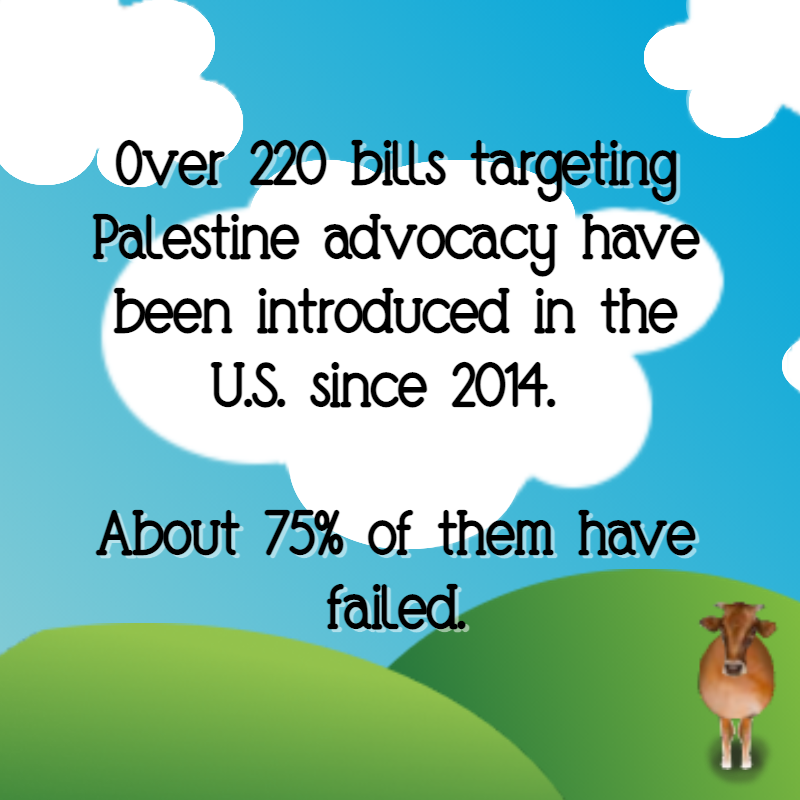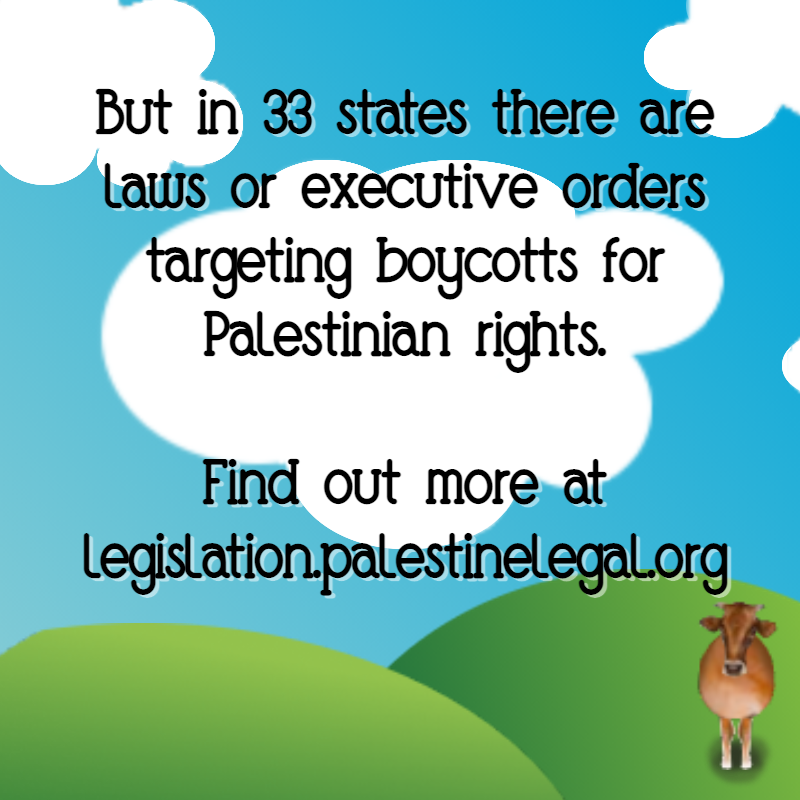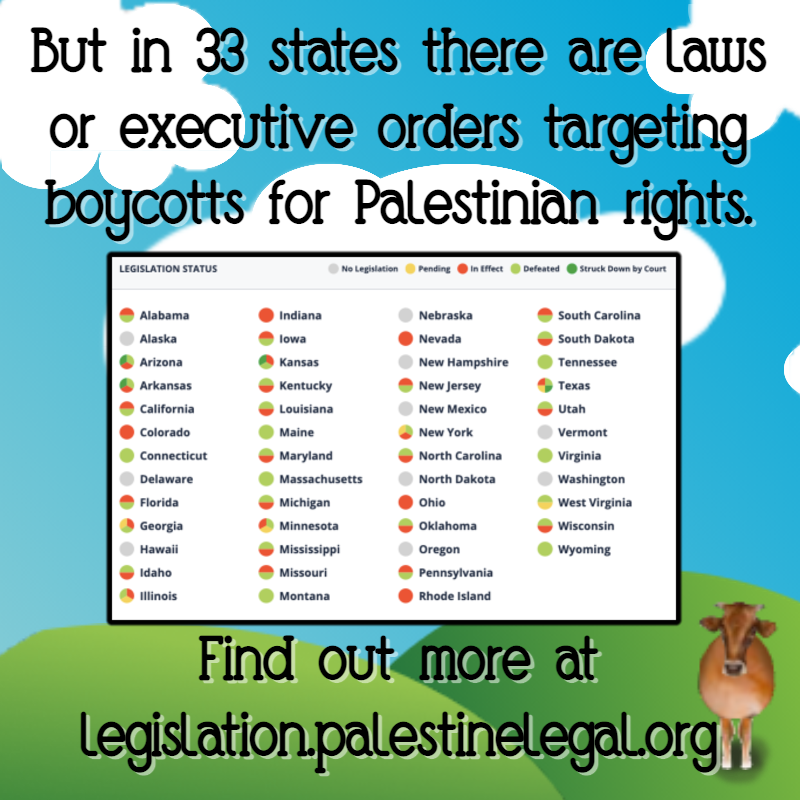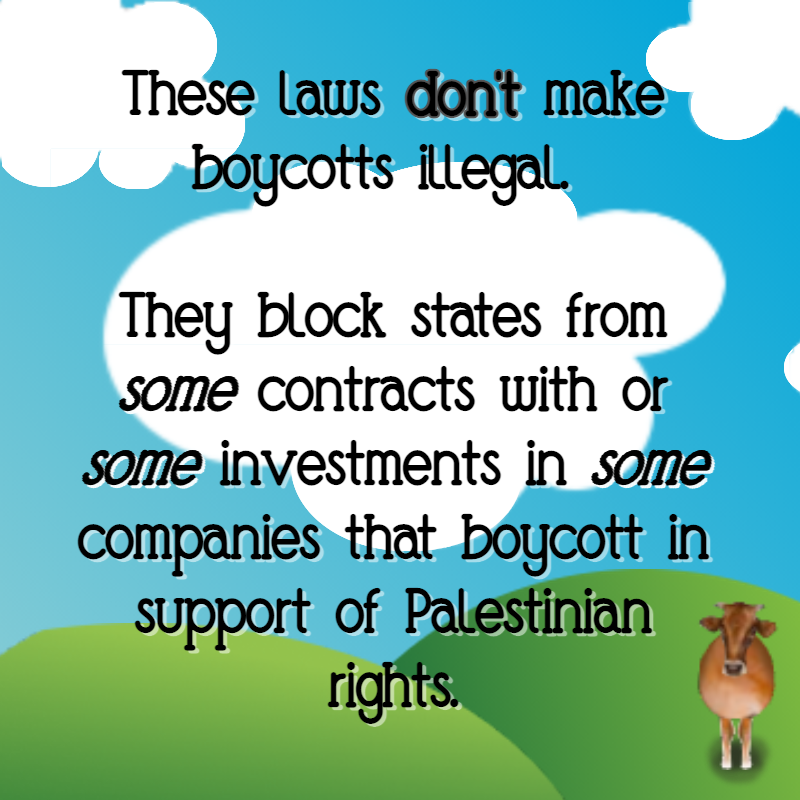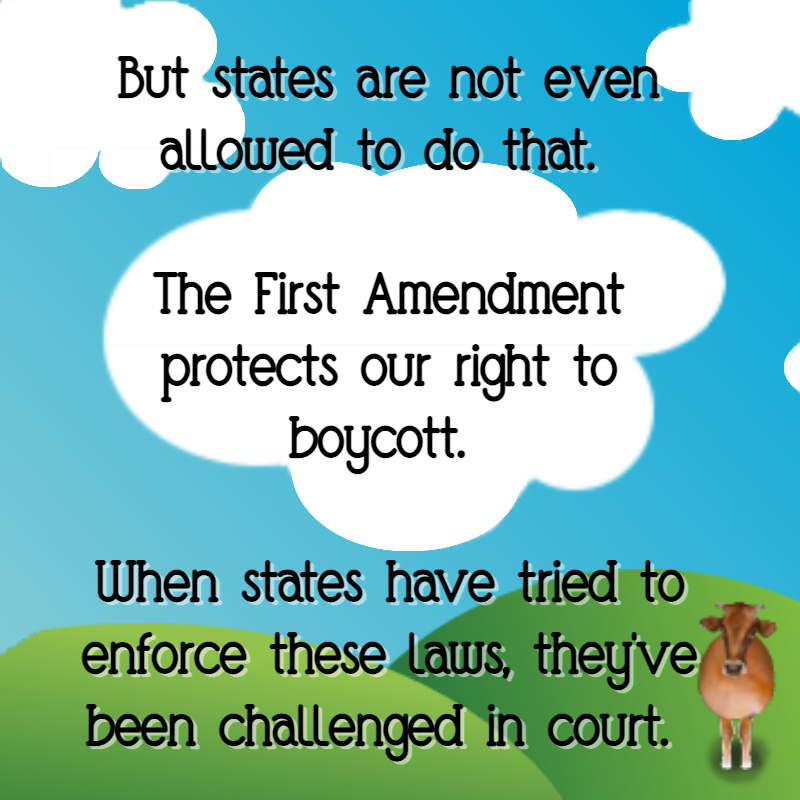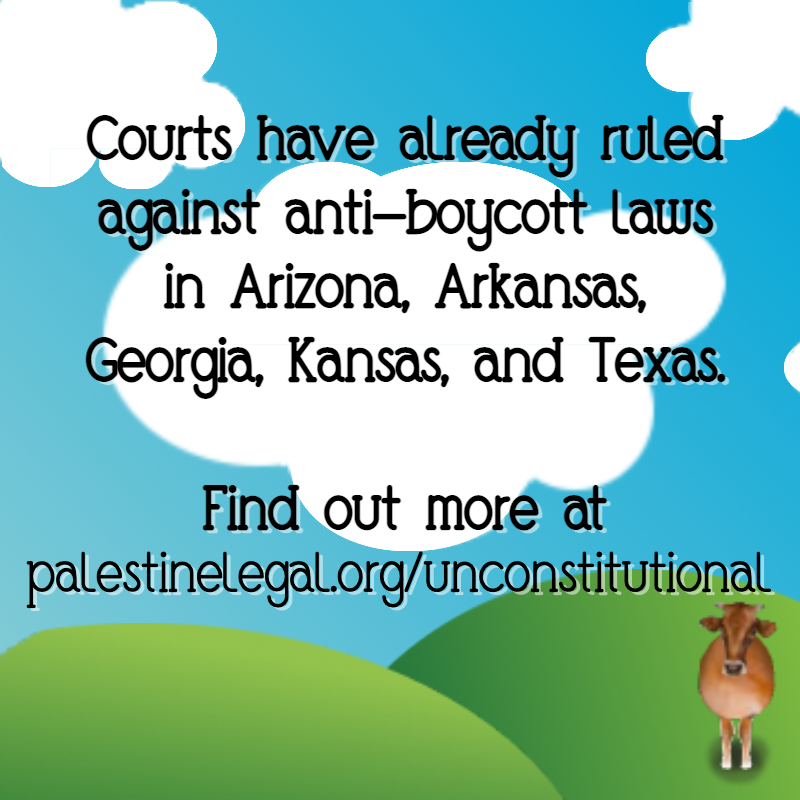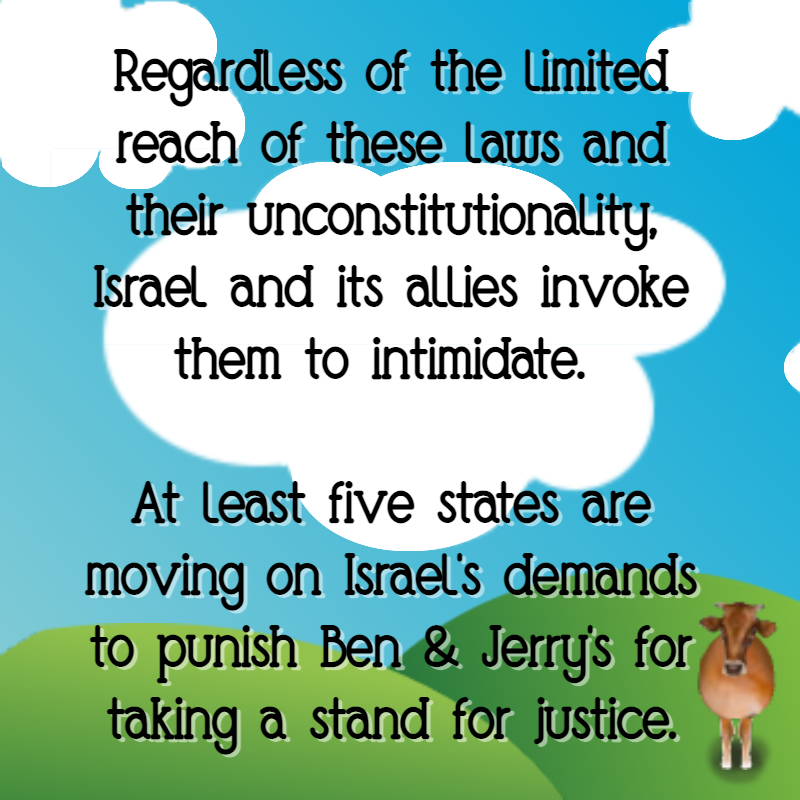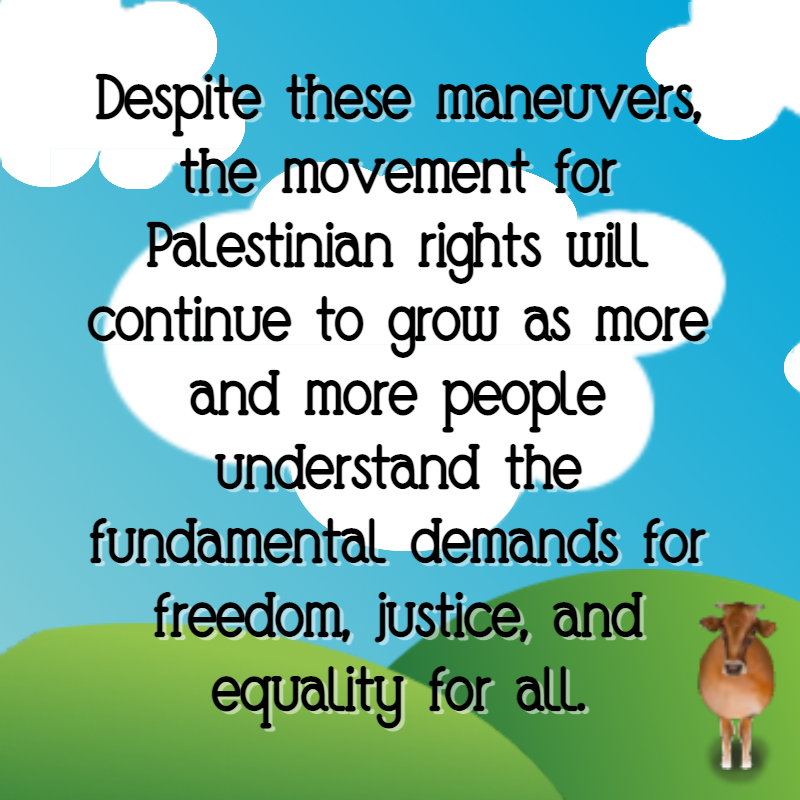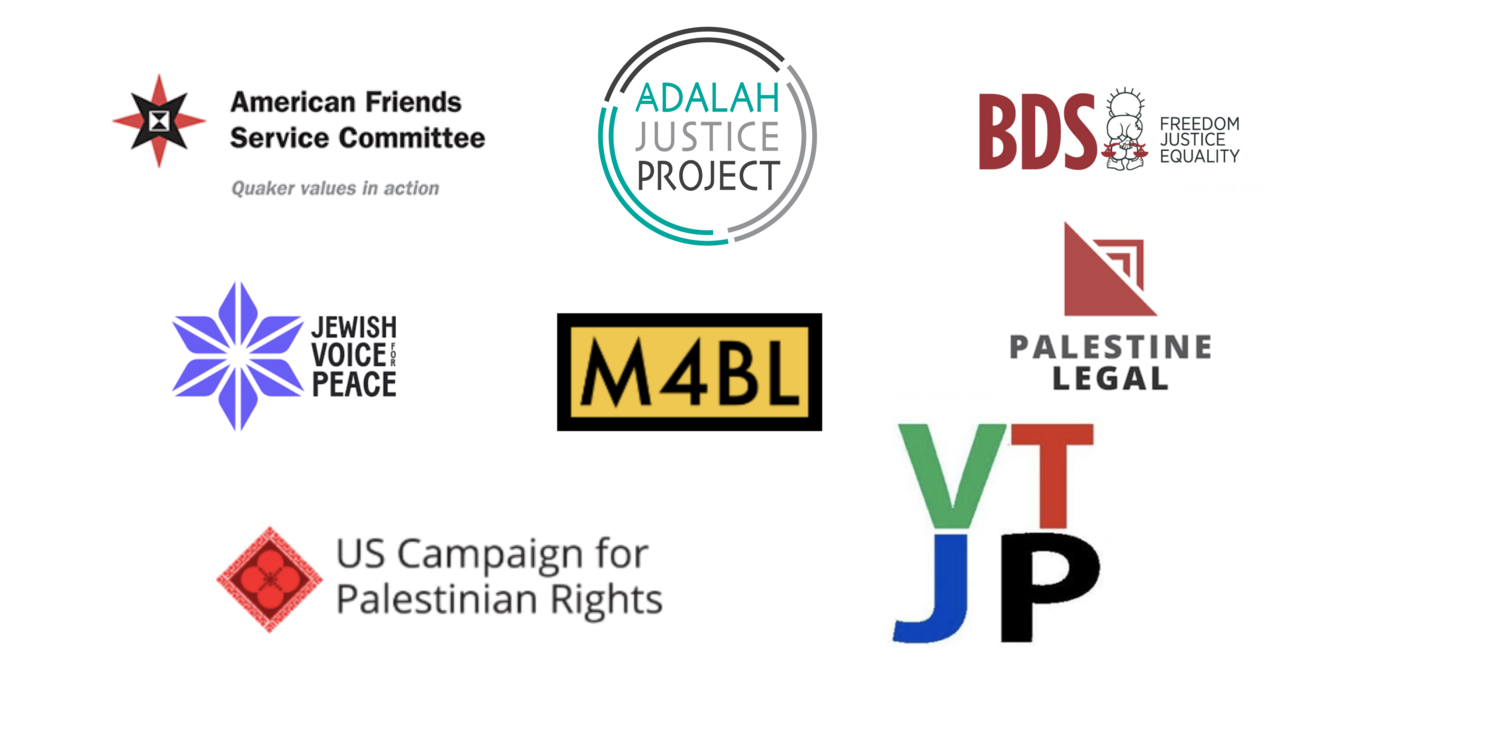The Right to Boycott Israel: Yours, Mine and Ben & Jerry’s
/In July, Ben & Jerry’s announced that the company will not renew its licensing agreement in Israel when it expires at the end of 2022. This effectively means the licensee will not sell or manufacture Ben & Jerry’s ice cream in Israel or its illegal settlements.
Following Ben & Jerry's announcement, Israeli government officials and their allies in the U.S. threatened to invoke some 30 state laws that target boycott, divestment and sanctions (BDS) campaigns for Palestinian freedom.
With anti-boycott laws back in the spotlight, Palestine Legal responded to numerous media requests about how these measures might apply to Ben & Jerry’s and whether the backlash will affect the right of individuals and organizations to boycott for justice in Palestine.
Here’s what you need to know: The First Amendment protects your right to boycott, and laws that aim to punish boycotts have been blocked over concerns that they violate the Constitution.
Anti-boycott laws do not make boycotts illegal—they attempt to prohibit states from making some contracts with and some investments in some companies that boycott in support of Palestinian rights. Israel and its allies invoke these laws in order to chill and deflect attention from Israel’s apartheid policies and violation of Palestinian rights.
You can view our Instagram series about Ben & Jerry’s and anti-boycott laws for more information or contact us if you have additional questions.
Partner organizations and movement allies have mobilized against this backlash as well, calling on parent company Unilever to publicly support the decision and to defend the chair of Ben & Jerry’s board, who has been singled out with an onslaught of racist, sexist, and violent threats.
Below we share additional context from media interviews and articles on Ben & Jerry’s, as well as two statements from movement partners about the backlash and broader political context.
At Risk in Israel’s Backlash Against Ben and Jerry’s? The Right to Protest. (The Nation)
Written by Palestine Legal attorney Amira Mattar
Almost as soon as Ben and Jerry’s announced its decision, Israel and its US lobby got to work threatening the ice cream company for heeding calls to end corporate profits made at the expense of Palestinian human rights. Israel’s prime minister warned Unilever that Israel plans to respond “aggressively” to the decision. Its president classified it as a form of “terrorism.” An ambassador sent a letter to the governors of 35 US states calling on them to enforce laws aimed at blocking boycotts against Israel for its violence against Palestinians.
My organization, Palestine Legal, has tracked how more than 30 states have enacted laws that prohibit state contracts and/or investments in entities that boycott or divest from Israel. Some create McCarthyite blacklists of boycotters. Others require vendors servicing the state to pledge in writing that they will not boycott Israel for the duration of the contract. Hundreds more copycat measures have been put forward across the country by Israel-supporting lawmakers.
But when these laws are challenged in court, federal judges have determined that a number of them are unconstitutional—and blocked them. Courts have been clear: Politically motivated boycotts dwell at the heart of First Amendment–protected activities. The Supreme Court ruled that boycotts against white-owned businesses in the Jim Crow South were protected. And courts have recently and repeatedly declared that boycotts protesting Israel’s human rights abuses are no different. Elected officials, Republicans and Democrats alike, who have taken up Israel’s appeal to punish Ben and Jerry’s are exhibiting their pro-Israel bona fides at the expense of all of our First Amendment rights.
First Amendment gets frozen out as US politicians threaten to lick Ben & Jerry’s (The Electronic Intifada)
Meera Shah, senior staff attorney at Palestine Legal, pushed back on the free speech claim. “Price’s statement serves only to trample on the First Amendment rights he claims to uphold – just like the unconstitutional anti-boycott laws adopted by many states.”
She added, “It’s disturbing to have Israeli and US officials join forces to crack down on the time-honored tactic of boycotting for justice. This is both a dangerous and distracting effort to suppress growing dissent against Israel’s violations of Palestinian rights.”
Shah also pointed out to The Electronic Intifada that unlike contract prohibitions which have been found unconstitutional by federal courts, the investment prohibitions that states such as New York and Florida are pursuing “encourage McCarthyite blacklists based on political positions. While these types of anti-boycott laws haven’t been tested in court, they raise constitutional concerns in that they are similarly intended to punish and chill protected expression in support of Palestinian rights.”
Israel Wants U.S. to Enforce anti-BDS Laws Against Ben & Jerry’s. Will It Work? (Haaretz)
According to Meera Shah, a senior staff attorney at the Palestine Legal organization that supports pro-Palestinian activists, 222 anti-BDS bills have been introduced across the United States in recent years, but less than a quarter have passed.
“This shows the effort being put into this and the relative lack of success in pushing them through,” she said. “To date, there has not been a single case in which a court has upheld the merits of one of these laws. That’s striking in terms of the constitutional infirmities of these laws,” Shah said.
However, she noted that there has been a clear impact on specific individuals caught up in the laws’ effects.
When asked if the decision by Ben & Jerry’s can be legally classified as a boycott, Shah said it’s important to recognize that different state laws define boycotts differently. Some bills mention specific boycotts targeting Israel or goods and services, for instance, while other legislation refers to a more all-encompassing boycott of allied countries or territories controlled by Israel.
“Whether or not the Ben & Jerry’s decision falls under the legal definition of a boycott or not, pro-Israel groups and anti-progressive politicians are going to do their best to punish Ben & Jerry’s,” she said.
Ben & Jerry’s may be first major test of American anti-BDS laws (The Forward)
Meera Shah, a senior staff attorney at Palestine Legal, said that details of laws meant to crackdown on the BDS movement was less important than their goal of cracking down on activism aimed at Israel. Palestine Legal, an American nonprofit, tracks and opposes anti-BDS laws.
“Israel and its allies use anti-boycott laws to smear Palestine advocacy regardless of the actual provisions, applicability, or constitutionality of the laws—or the focus of the activism,” Shah wrote in an email. “Going after an ice cream company for supporting Palestinian rights exposes how desperate Israel and its allies are to avoid accountability for human rights abuses.”
Can Israel criminalise Ben & Jerry’s ice cream in the US? (Al Jazeera English)
“It’s disturbing that we have foreign officials here trying to enlist US lawmakers in cracking down on one of our country’s most time-honoured constitutional rights, in order to suppress growing dissent against Israel’s violation of Palestinian rights,” said Amira Mattar, a lawyer at Palestine Legal, which tracks anti-BDS legislation across the US.
N. Hempstead ban on Ben & Jerry’s sparks backlash (The Island Now)
Though its decision received international attention, the intended message of the progressive company may have been lost, said Kristian Bailey, communications manager at Palestine Legal. His non-profit organization supports Palestinian activists with legal advice.
“Palestine is being singled out as somehow undeserving of human rights or undeserving of the ability to protest for those human rights,” Bailey said. Participating in boycotts or aligning with the BDS movement is what helps “putting pressure on a big world power that refuses to acknowledge human rights of an oppressed population.”
Movement Statements on Ben & Jerry’s
National Lawyers Guild-SF Bay Area & Palestine Subcommittee Condemns Hateful Acts and Threats Against Ben & Jerry’s and the Chair of Its Board of Directors
Since the announcement was released, the Company, particularly the Board Chair, has received relentless attacks, hate messages, and threats, including death threats from Israel supporters.
These threats against Ben & Jerry’s multi-racial board and South Asian Chair reflect recent threats and acts of violence by emboldened white nationalists and other racists against social justice leaders and activists across the United States whose views threaten their racist and often misogynist agenda.
The National Lawyers Guild condemns these hateful and violent threats directed against any Board member, staff, and anyone else connected to the decision to end the sale of Ben & Jerry’s ice cream products in the OPT.
Movement Orgs’ Statement on Ben & Jerry’s
Israel treats its illegal settlements as part and parcel of the state and codifies this into law. Israel’s apartheid system is clearly reflected in the racist Nation State Law, which denies indigenous Palestinians their right to self-determination.
The reality is undeniable: Israel rules over the lives of all people living between the Jordan River and Mediterranean Sea, and denies Palestinians their rights. Palestinians live under blockade, occupation, and apartheid. No company should profit off apartheid and settler-colonialism.
We must continue to uplift the Palestinian call for freedom, and to demand a world free of all oppression now.
Take action to uplift the Palestinian call for justice and protect the right to protest:
Express support for Ben & Jerry’s board decision, urge Unilever to publicly uphold and support the decision and Board Chair Mittal. Call on other companies to follow suit.
Organize against the onslaught of unconstitutional federal and state bills curtailing First Amendment rights to protest and boycott. Contact your representatives to reject S. 2119 and connect with groups in your state here.
Learn how to support or plug into existing BDS campaigns here.
Support Palestinians on the ground who are being persecuted for protesting against Israel’s occupation, settler-colonialism and apartheid.


